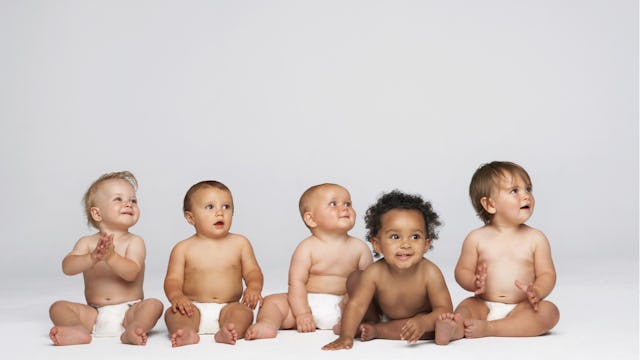Babies Don’t Get Confused By Learning More Than One Language

Bilingual babies are also better listeners
Learning a new language is difficult for adults — it’s said the longer you wait to learn it, the harder it is to master the complexities of a second language. Which is just one of a multitude of benefits in raising a bilingual baby. According to a new study by Princeton University, bilingual infants as young as 20 months begin to show cognitive advances that last a lifetime. They don’t confuse the two languages – they are actually able to naturally switch their vocabulary based on whatever language is being used around them at the time.
So if you have a baby and you’re exposing them to two languages now, they can have an advantage with communication for the rest of their lives. That’s huge.
When it comes to young toddlers who are bilingual, being able to differentiate between words in two languages is easy-peasy.
Casey Lew-Williams, an assistant professor of psychology and co-director of the Princeton Baby Lab, is also co-author of the study of bilingual babies and toddlers. “They do not think that ‘dog’ and ‘chien’ [French] are just two versions of the same thing,”Lew-Williams said. “They implicitly know that these words belong to different languages.”
Researches in the study gathered two sets of 24 French-English bilingual infants and adults to study language learning patterns. In order to determine infants’ ability to monitor and control language, researchers showed both the children and adults photos of similar objects in both languages, and spoke in sentences using both languages. The results of the study were based on cognitive behaviors when switching from the dominant language to the non-dominant one. Infants did not show signs of confusion between languages during the study.
Both adults and toddlers showed similar results, which implies “bilinguals across the lifespan have important similarities in how they process their languages,” Lew-Williams said.
What’s fascinating about this new information is that despite many behaviors to the contrary, it proves that babies and toddlers are actually listening to us. So much so, in fact, when it comes to bilingual children, there’s a “bilingual advantage.” Bilingual children perform better with tasks that require switching from a previously learned response.
So basically, bilingual kids are better listeners and more easily adapt to change.
Which disputes a widely-held notion that bilingual children lag behind in language development. Many families in the U.S. and all over the world are bilingual, switching between native tongues and adopted languages frequently ant naturally. When this happens, according to the study, no extra processing time is needed for infants and small children to understand the switch.
“We believe that everyday listening experience in infancy — this back-and-forth processing of two languages — is likely to give rise to the cognitive advantages that have been documented in both bilingual children and adults,” Lew-Williams said.
This article was originally published on